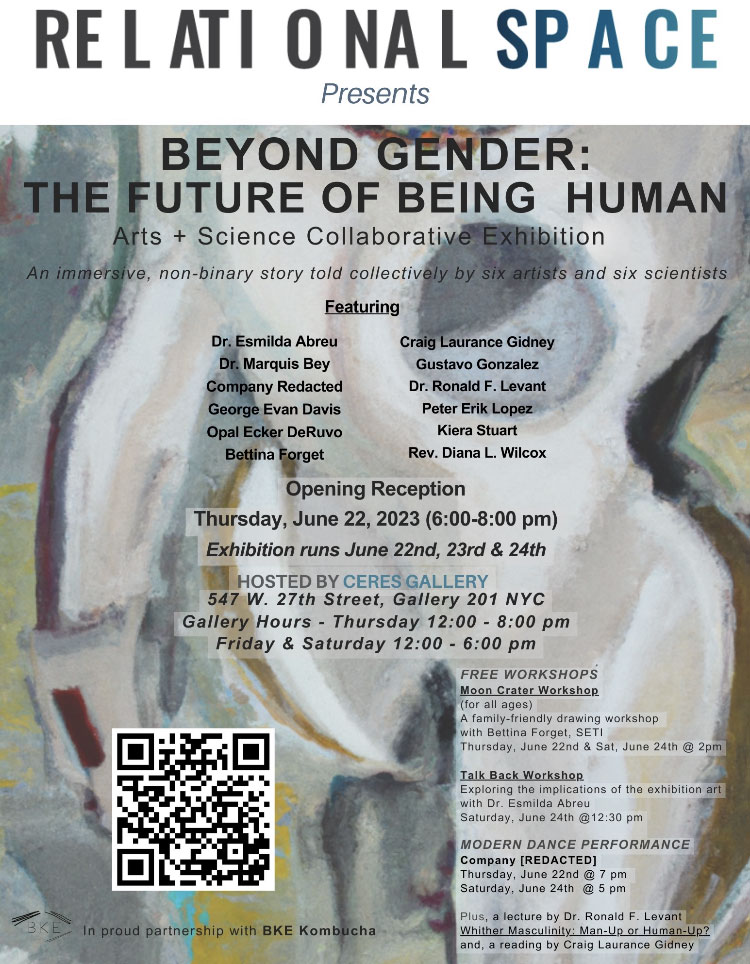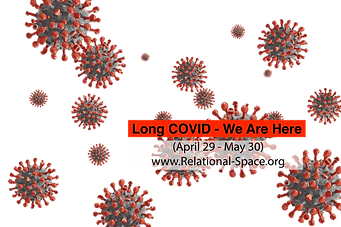Is that a statement or a question? Which word should the emphasis even be on? What is the fundamental essence that we could/should be striving for?
These are core questions raised when we start to unpack the concept of the future of being human but alongside potential answers we can also unpack how those answers can be approached in the first place. Collaborative knowledge sharing supported by trust-based relationships can provide the launching pad to co-create breakthrough and blended ideas. Yet, this state of sharing takes effort and mutually held values to achieve as well as great skill to facilitate.

Beyond Gender: The Future of Being Human, a contemporary Art-Science exhibition curated and facilitated by the inspirational Relational Space Gallery/Forum, brought together twelve international artists, scientists, activists, and spiritual leaders to exchange talents and expertise while telling a non-binary story. Beyond Gender empathically reflects upon the impact of rigid gender roles on individuals and society, expressing a future where we are able to move beyond power structures and imposed social restrictions. The exhibit included visual art, dance performance, community workshops, and visitor participation to collectively and actively explore gender and fluidity.
The in-person launch of Beyond Gender on the 22nd of June in New York during PRIDE month provided a rare opportunity to encourage debate in an increasingly polarised discussion space. The presence of André de Shields highlighted its inimitable and important place in the current conversation surrounding the binary. Reflecting on the threads of intertwined, systemic inequalities, visionary facilitator Dr Leigh W. Jerome, the Exec Director and Founder of Relational Space, challenged viewers to envision a world of equity, inclusivity, and emotional connections while seeking to inspire activism that nurtures systemic change. Beyond Gender is the second Art-Science exploration by Relational Space. During the COVID-19 pandemic, a fearless exploration into the long-haul of Long COVID produced a virtual immersive installation aptly named Long COVID – We Are Here! Created in 2021 when there was an almost total lack of recognition of the syndrome and very few resources to address Long COVID’s serious physical symptomatology, Long COVID – We Are Here! remains one of the most comprehensive transdisciplinary examinations of a multi-organ condition that affects 1 in 3 individuals who contract COVID-19.

Both of these boundary-spanning collaborations have centred around establishing communal values across all participants recognising that there is a set of practical mechanisms that enable members to dynamically explore and iteratively blend ideas. Mutual empathy and knowledge exchange are reciprocal and dynamic processes actively able to promote respect, build better understanding of all points of view, and create relational empowerment. Exploring a plurality of ideas rather than a narrow end-goal with singular linear progress, coupled with a diverse constellation of participants, means that collaborative outcomes of these two very different projects are able promote new forms of inspiration and expression.
In a world that appears more divided than ever, opportunities for self-reflection and learning that bring people together physically and emotionally create a more nuanced and unified social understanding of issues. These opportunities must be revered and engaged with as fully as we can, as often as possible. The Centre for Global Lives is committed to developing and contributing to transdisciplinary art-science explorations of the challenges that societies at local, national and global levels face in the 21st century. GL is proud to support leaders like Leigh W. Jerome and Relational Space’s efforts to drive collaborative action. It has been a huge privilege to bear witness to the continued mobilisation of sensation, imagination, and agency.
Reported by
Dr Shona Paterson
Director of the Centre for Global Lives, Long COVID – We Are Here! participant, viewer of Beyond Gender: The Future of Being Human